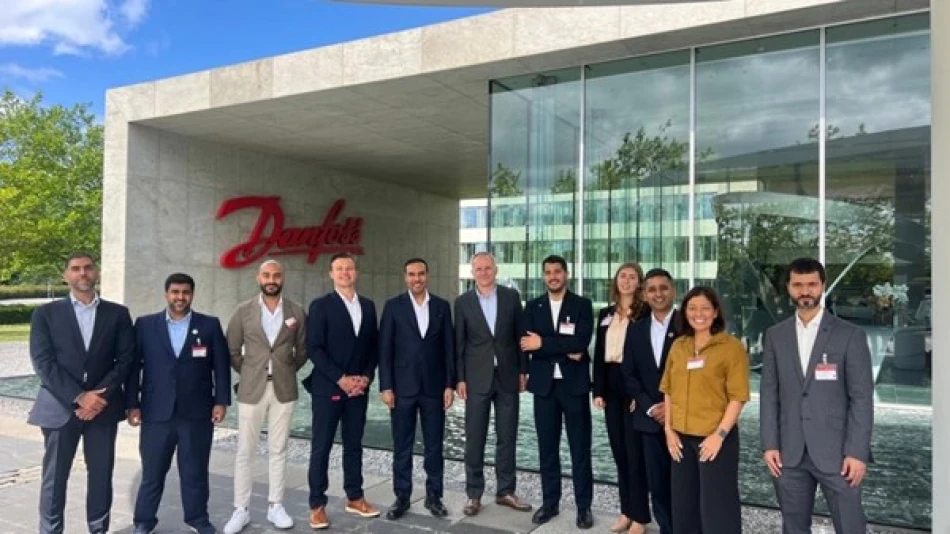
Water Efficiency Alliance and Energy for Water Solutions Conclude Technical Visit to Denmark
Middle East Water Alliance Looks to Denmark for Solutions as Gulf States Race Against Water Scarcity
As Gulf Cooperation Council nations pour billions into sustainable water infrastructure, the Middle East Water Efficiency Alliance has completed a strategic technical mission to Denmark, seeking proven solutions for wastewater reuse and circular economy models. The timing reflects mounting urgency across the region, where water security has become a national priority intertwined with climate neutrality goals and economic diversification plans.
Strategic Timing Amid Massive Gulf Water Investments
The high-level delegation's visit to Denmark, organized in partnership with Taqa Water Solutions and supported by the Danish Trade Council, comes at a pivotal moment. GCC states are accelerating strategic investments in sustainable water projects, aligning with national frameworks including the UAE's Water Security Strategy 2036, the Net Zero Initiative 2050, and Saudi Arabia's Vision 2030.
This convergence of national strategies signals a fundamental shift in how oil-rich nations view water infrastructure—not merely as a utility challenge, but as a cornerstone of economic resilience and climate adaptation.
Why Denmark Holds the Keys to Gulf Water Innovation
Denmark's selection as a learning destination reflects its global leadership in sustainable water practices and innovation. The Nordic nation has developed extensive practical expertise in wastewater reuse, stormwater system resilience, and utility efficiency optimization—precisely the areas where Middle Eastern nations face their greatest challenges.
For Gulf states grappling with extreme water stress and energy-intensive desalination dependency, Denmark's decades of experience in resource recovery and circular economy applications offer a roadmap for sustainable scaling.
Technical Focus Areas
The delegation's field visits to Danish water utilities, technology companies, and research institutions centered on several critical technologies:
Advanced wastewater treatment and reuse systems capable of handling high-sediment water sources common in arid regions. Energy-efficient pumping and treatment technologies that could dramatically reduce the carbon footprint of water operations. Data-driven smart water infrastructure designed to optimize operational efficiency through predictive analytics and automated systems.
The program included dedicated sessions at Biofos, Denmark's largest wastewater treatment facility, and Aarhus Water, the country's second-largest water utility, showcasing real-world applications of sustainable operations and customer-focused water services.
From Knowledge Transfer to Market Implementation
The mission identified concrete pathways for future technical cooperation and project development between Taqa Water Solutions and WEMA members. Key areas for continued collaboration include feasibility studies for implementing Danish technologies in regional markets and joint exploration of pilot projects designed to demonstrate impact and scalability.
This structured approach to technology transfer reflects lessons learned from other successful Gulf innovation initiatives, where proof-of-concept projects have paved the way for large-scale deployment across multiple emirates and kingdoms.
Operational Challenges as Innovation Opportunities
Taqa Water Solutions highlighted specific operational priorities during the visit, including innovation to improve energy consumption efficiency, enhanced management of sediment-heavy water sources, and meeting large-scale pumping requirements. These challenges represent clear opportunities for targeted collaboration and joint innovation with WEMA members.
Circular Economy Vision Drives Regional Transformation
Ahmed Al Shamsi, CEO of Taqa Water Solutions, emphasized the company's innovation-driven approach to comprehensive sustainability: "Through our innovation-focused vision, we ensure every drop of water is collected, treated, and reused, embodying our commitment to building a secure and prosperous water future for generations to come."
This vision aligns with broader Gulf economic diversification strategies, where circular economy principles are increasingly viewed as essential for reducing resource dependency and creating new value streams from waste products.
Regional Implications and Investment Outlook
The Denmark mission signals accelerating momentum in Middle Eastern water technology adoption, with potential implications for international water technology companies seeking regional partnerships. As Gulf states move beyond traditional desalination-heavy approaches, opportunities are emerging for innovative treatment technologies, smart infrastructure solutions, and integrated resource recovery systems.
For investors and technology providers, the structured approach to Danish-Gulf cooperation suggests a maturing market ready for significant capital deployment in proven, scalable water technologies. The focus on feasibility studies and pilot projects indicates a methodical path from concept to commercial implementation across multiple GCC markets.
Most Viewed News

 Layla Al Mansoori
Layla Al Mansoori






